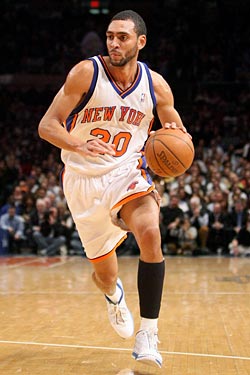
Depending on which report you’ve read most recently, the Knicks are either about to trade for the Rockets’ Tracy McGrady, already have, or have completely changed their mind. The trading deadline is Thursday, so we’ll know soon enough. Whether the trade, as currently constituted, is a good one for the Knicks is being hotly debated, both inside the Knicks’ offices and among the four or five of us who still deeply care. We’re not here to cast judgments — we’re here to lay out the parameters. You’ve got questions, we’ve got answers.
What does the trade look like right now?
The most recent report looks like this:
To the Knicks: Tracy McGrady, Joey Dorsey, Brian Cook (the former Illinois forward, not the Michigan blogger), Houston’s 2011 first-round draft pick.
To the Rockets: Jared Jeffries, Jordan Hill, Al Harrington, or Larry Hughes, New York’s 2011 and 2012 first-round draft pick.
How many of these players are under contract for the 2010–11 season?
One, Jordan Hill. Two, Jordan Hill and Jared Jeffries.
Which team comes out better for the rest of the 2010 season?
Realistically, the Rockets, because they have a far better chance of making the playoffs than the Knicks do. (30.6 percent, to the Knicks’$2 0.6 percent, according to John Hollinger.) McGrady instantly becomes the Knicks’ third-best player, behind David Lee and Danilo Gallinari, and would certainly make the team more entertaining down the stretch. But it probably doesn’t help them make the playoffs.
Is the McGrady aspect of the deal just for this season?
Officially, yes: McGrady’s contract expires after this year. But Knicks president Donnie Walsh is hoping to keep McGrady around after this season, depending on what happens in off-season free agency, and McGrady is on record as saying he’d love to play in New York.
What’s this trade really about?
LeBron, of course. Or at least, the LeBron/Wade/Bosh free-agency jamboroo. The Knicks still have two remnants of the Isiah era hanging around: Jared Jeffries and Eddy Curry. Walsh has made it his goal to trade them, and with this, he finally rids himself of Jeffries and his $6,883,400 next season. The goal is as it has always been: payroll.
How much farther under the cap does it get the Knicks?
According to HoopsHype, with those expiring Rockets contracts, and the trade of Hill and Jeffries, the Knicks drop $9,552,920, leaving them with a 2010–11 payroll of exactly $17,782,904. (If they could figure out a way to get rid of Curry, they’d be down to $6,506,041. Of course, then they’d only have three players on the roster: Gallinari, Wilson Chandler, and Toney Douglas.)
Is that enough to offer LeBron and another free agent a max contract?
That’s the goal, isn’t it? Well: It’ll be close. We won’t know until the summer what the salary cap is, but some estimate it could go as low as $48–50 million. The max contract figure is $16.6 million per player. So two max contracts, plus the players they currently have on the roster, brings the number to $50,982,904. The Knicks need to hope the salary cap doesn’t drop as low as some fear it might. Of course, with those two max contracts combined, Gallinari/Chandler/Douglas/Curry make for a total of six players on the roster. Six.
So you’re saying that trading Jeffries, while admirable and important, probably isn’t enough, and they probably need to trade Curry, too?
Yes.
How much longer do we have to deal with the Isiah era stink?
It won’t be long now. You can groan when the Jazz take the Knicks’ first-round pick this June, and you can enjoy the quest to trade Curry’s expiring contract next season. Then it will all be over. Finally.
What are they losing in this trade?
Jeffries, while a nice defender, is no loss: The Knicks certainly don’t need him in the present or the future. Jordan Hill is debatable: He hasn’t impressed much this year, but he has come on of late and is considered by some as a potential complementary player on a championship team. (He shoots better than people realize, but his defense, so far, has been a disaster.) Perhaps more to the point: Boy, the Knicks sure are giving up a lot of draft picks, aren’t they? They’d be swapping picks with the Rockets next year, which won’t be painful if they get LeBron/Wade/Bosh but will be tragic if they don’t. And then they’re giving up another first-round pick the year after that. There is a school of thought that draft picks of complementary players are nice, but what you really need are superstars, and the payroll to grab them. This trade would definitely subscribe to this notion.
So what happens if they don’t get LeBron and Wade/Bosh/whomever this off-season?
If this trade goes through, they are doomed. With no big free agent coming in, you’ll have a team of Gallinari, Douglas, Curry, Chandler and … well, whatever detritus is lying around. And there will be a low draft pick next year and none in 2012 to fill the coffers. The Knicks are going all-in for this summer’s free-agent bounty with this move. It’s an extremely risky maneuver, with a potentially massive reward. But if it doesn’t work, this team is going to be even worse than it is now, for a long time into the future. Don’t expect Mike D’Antoni to stick around much after that.
Is all this worth it to see McGrady run around in a Knicks uniform?
No, but you know, that will be pretty cool.
